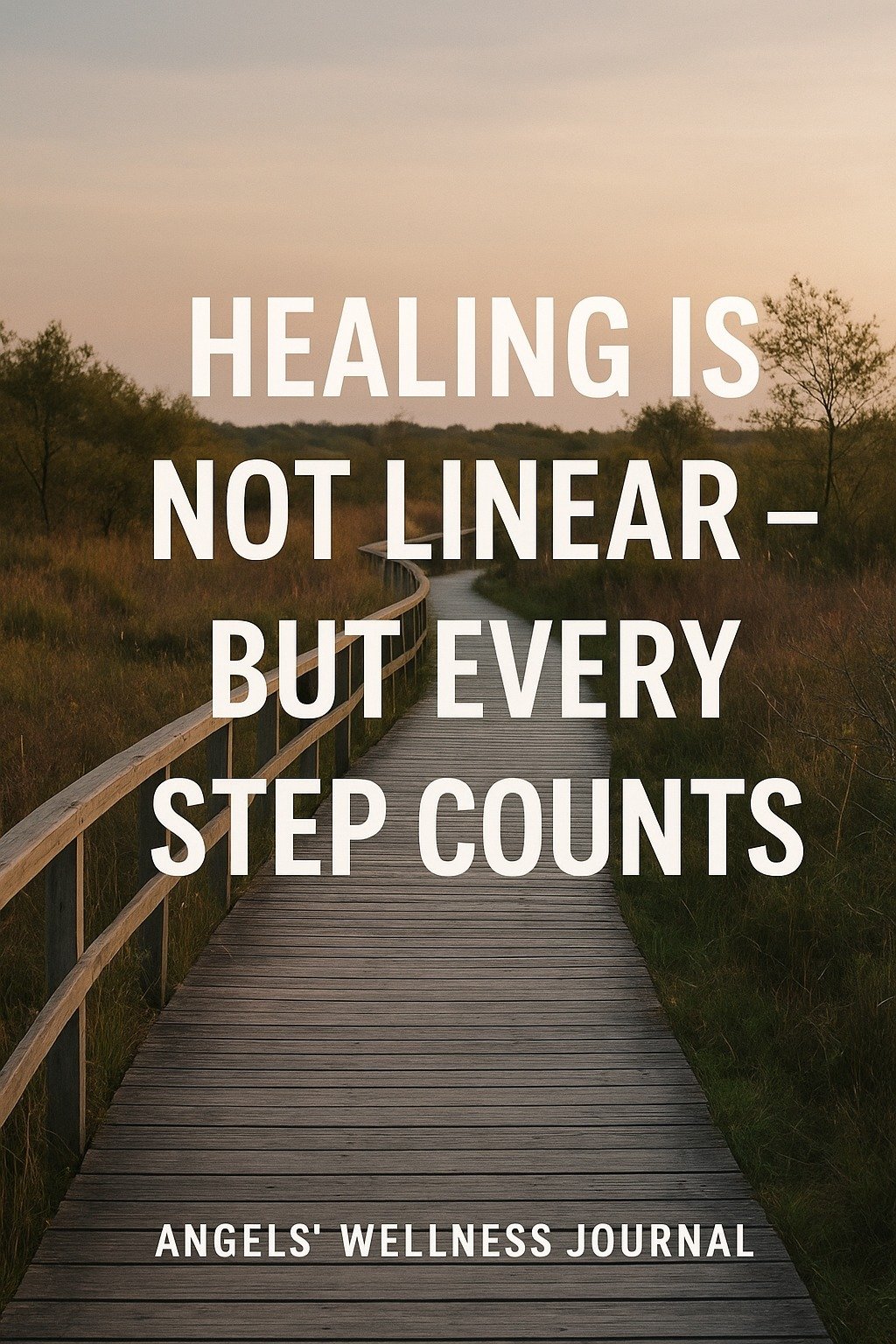
Angels’ Wellness Journal
Angels’ Wellness Journal is more than just a notebook—it’s a guided companion for your mental, emotional, and spiritual well-being. Thoughtfully designed with reflection prompts, affirmations, and self-care practices, it helps you release stress, embrace gratitude, and stay connected to your inner peace. Whether you’re seeking healing, balance, or personal growth, this journal provides the space to nurture yourself every day.
A beautifully designed journal to support your healing and self-care journey. Track your thoughts, reflect on emotions, and build habits that bring peace and balance.
💫 Start your journey to inner healing.
With Angels’ Wellness Journal, you’ll discover a safe space to reflect, grow, and embrace wellness in every part of your life.

Healing Is Not Linear – But Every Step Counts 🌱
Healing, whether emotional, mental, or physical, is a deeply personal journey. Many people imagine it as a straight path: a beginning, middle, and end where progress moves forward without setbacks. In reality, healing rarely works this way. It is often messy, unpredictable, and filled with both advances and setbacks. But the truth remains—every single step, no matter how small, matters.
Healing Is a Journey, Not a Destination
When we set out to heal—whether from trauma, loss, illness, or emotional pain—it’s natural to want quick results. Yet, healing is more like a winding road than a straight line. Some days feel full of progress and hope, while others may bring unexpected challenges or relapses. These ups and downs don’t mean failure; they are part of the natural rhythm of growth.
The Importance of Small Steps
Each effort—choosing to rest, practicing mindfulness, seeking support, or even simply getting out of bed—contributes to the healing process. Small victories should not be overlooked. Over time, they build resilience and create lasting transformation.
Why Setbacks Don’t Mean Starting Over
One of the most discouraging parts of healing is facing setbacks. However, setbacks are not erasure; they are opportunities to learn. They remind us of our strength, help us recognize what triggers us, and allow us to adjust our coping strategies. Think of them as detours, not dead ends.
Embracing Patience and Compassion
Healing requires patience, but more importantly, it requires self-compassion. Being gentle with ourselves during hard moments is essential. Instead of expecting perfection, we can celebrate progress and acknowledge that healing looks different for everyone.
Every Step Counts
No matter how small, every step you take toward healing brings you closer to wholeness. The path may curve, stall, or even backtrack, but you are still moving forward. Healing is not about speed—it’s about commitment and courage to keep going.
✨ Remember: Healing is not linear – but every step counts. Trust your process, honor your journey, and celebrate the progress you make each day.

5 Signs of Unresolved Trauma
Trauma can leave a lasting impact, often lingering long after the event has passed. When left unresolved, it can silently shape our thoughts, behaviors, and even our physical health, making us feel perpetually on edge or disconnected.
This post sheds light on the subtle but significant ways unresolved trauma can manifest in daily life. We’ve compiled 5 key signs to help you recognize if you or someone you know might be carrying the weight of a past wound. From overwhelming emotional reactions to unexplained physical ailments and a constant state of hypervigilance, these signs are not weaknesses they are signals from your mind and body that it’s time to heal.
Understanding these signs is the first, brave step toward reclaiming your peace. You don’t have to carry this burden alone. By recognizing what’s happening, you open the door to seeking the support and compassion you deserve.

The Overwhelm
Ever feel like a small setback sends you into a spiral? One of the biggest signs of unresolved trauma is a disproportionate emotional reaction to everyday stressors.

The Avoidance
Do you find yourself making excuses to avoid certain people, places, or situations? This isn’t just shyness. It’s a classic trauma response to protect yourself from triggers.

The Physical Symptoms
Unexplained headaches, stomach issues, or chronic pain? Trauma isn’t just mental; it’s stored in the body. Listen to what your body is trying to tell you.

The Hypervigilance
Always on high alert, scanning for potential threats, or expecting the worst? This constant state of ‘fight or flight’ is a key indicator that your nervous system is stuck in survival mode.

The Dissociation
Feeling disconnected from your body, emotions, or reality? Dissociation is a coping mechanism where your mind “checks out” to protect you from overwhelming pain.
Recognizing these signs is the first step toward healing. If any of these resonate with you, remember you’re not alone. Help is available. Visit our blog to learn more about trauma-informed care and find resources for support. #TraumaHealing #MentalHealth #UnresolvedTrauma #HealingJourney #SelfCare